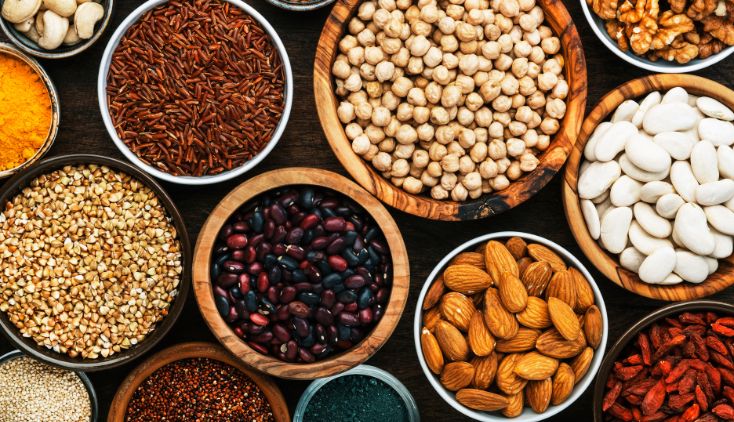A Guide to Healthy Eating for Blood Sugar Control
Managing diabetes doesn't have to be overwhelming. One of the most powerful tools at your disposal is your daily diet. The foods you choose can make a big difference in controlling blood sugar, supporting healthy weight and preventing complications. In this guide, we'll break down how to manage diabetes with your diet, starting with a list of foods that are both nutritious and effective in helping to keep blood sugar levels in check.
Best Foods for Managing Diabetes
1. Leafy Green Vegetables
Leafy greens like spinach, kale and collard greens are packed with vitamins, minerals and fiber, yet they are very low in carbohydrates and calories. Their high fiber content helps slow the absorption of sugar into the bloodstream, preventing blood sugar spikes. Plus, they are rich in antioxidants that reduce inflammation, which is beneficial for people with diabetes.
2. Whole Grains
Switching from refined grains to whole grains is a smart move for blood sugar control. Whole grains like quinoa, brown rice, oatmeal and whole wheat bread contain more fiber and nutrients than their refined counterparts. The fiber in whole grains slows digestion, resulting in a gradual release of sugar into the bloodstream, which helps keep blood sugar levels stable.
3. Berries
Berries such as blueberries, raspberries and strawberries are a great fruit choice for those with diabetes. They are low on the glycemic index, meaning they have a smaller impact on blood sugar compared to other fruits. Berries also provide fiber, vitamins and antioxidants, which can help reduce inflammation and improve insulin sensitivity.
4. Fatty Fish
Fish like salmon, sardines and mackerel are high in omega-3 fatty acids, which have been shown to reduce inflammation and lower the risk of heart disease — a common concern for people with diabetes. Including fatty fish in your diet supports heart health and may help improve insulin function.
5. Beans and Lentils
Beans, lentils and chickpeas are loaded with fiber and plant-based protein, making them excellent foods for blood sugar management. Their combination of fiber and protein slows digestion, keeps you feeling full longer and helps maintain steady blood sugar levels.
6. Nuts and Seeds
Almonds, walnuts, chia seeds and flaxseeds provide healthy fats, protein and fiber, all of which can improve blood sugar control. These foods can also help lower cholesterol levels and support heart health, which is essential for people managing diabetes.
How These Foods Help Manage Blood Sugar
The key to how to manage diabetes with your diet lies in the quality of the carbohydrates you consume and the balance of nutrients in your meals. The foods listed above offer several benefits:
- Fiber slows digestion. Fiber-rich foods slow the breakdown of carbohydrates, preventing sudden spikes in blood sugar.
- Low glycemic index choices. Foods like berries, beans and whole grains release sugar into the bloodstream slowly, leading to more stable blood sugar levels.
- Healthy fats and proteins. Including healthy fats and proteins from nuts, seeds and fish in your meals helps you feel satisfied and prevents overeating.
Incorporating these foods into your daily meals can help you create a balanced diet that supports long-term diabetes management.
Tips for Managing Diabetes with Your Diet
Focus on Balanced Meals
Every meal should include a balance of fiber-rich carbohydrates, healthy fats and lean proteins. This balance helps keep blood sugar levels stable and promotes satiety.
Watch Portion Sizes
Even healthy foods can affect blood sugar if eaten in large quantities. Use smaller plates, read food labels and practice mindful eating to avoid overeating.
Limit Processed Foods
Highly processed foods often contain added sugars, refined grains and unhealthy fats that can spike blood sugar and lead to weight gain. Choose whole, unprocessed foods whenever possible.
Stay Hydrated
Water is the best beverage choice for people with diabetes. Staying hydrated helps your body eliminate excess sugar through urine and prevents dehydration-related blood sugar spikes.
Monitor Carbohydrate Intake
Carbohydrates have the most immediate effect on blood sugar levels. Learn to count carbs or use tools like the glycemic index to choose smarter carb options.
Final Notes
Understanding how to manage diabetes with your diet is a key part of living a healthy, balanced life with diabetes. By focusing on nutrient-dense, fiber-rich foods like leafy greens, whole grains, berries, beans and healthy fats, you can take control of your blood sugar levels naturally.
Remember, small, sustainable changes to your eating habits can lead to big improvements in your health. Always work with your healthcare provider or a registered dietitian to create a personalized eating plan that fits your needs.
Keep reading to learn about different brain and memory supplements.
